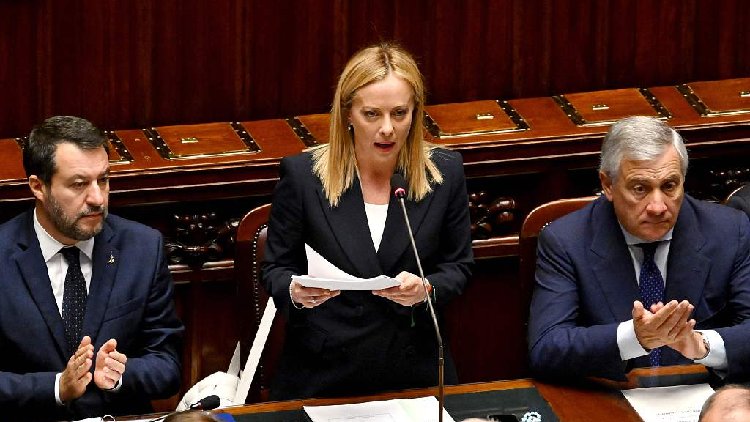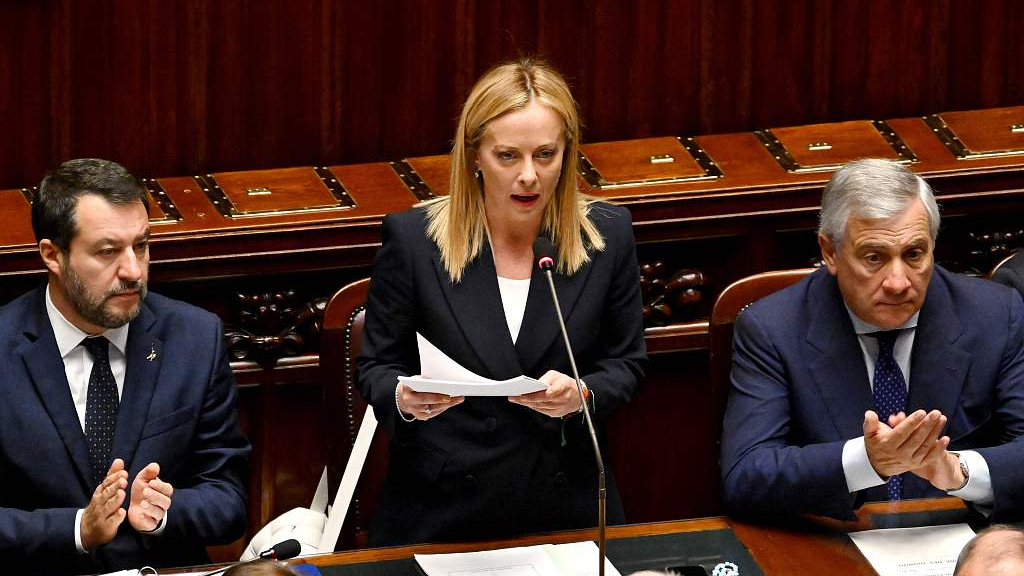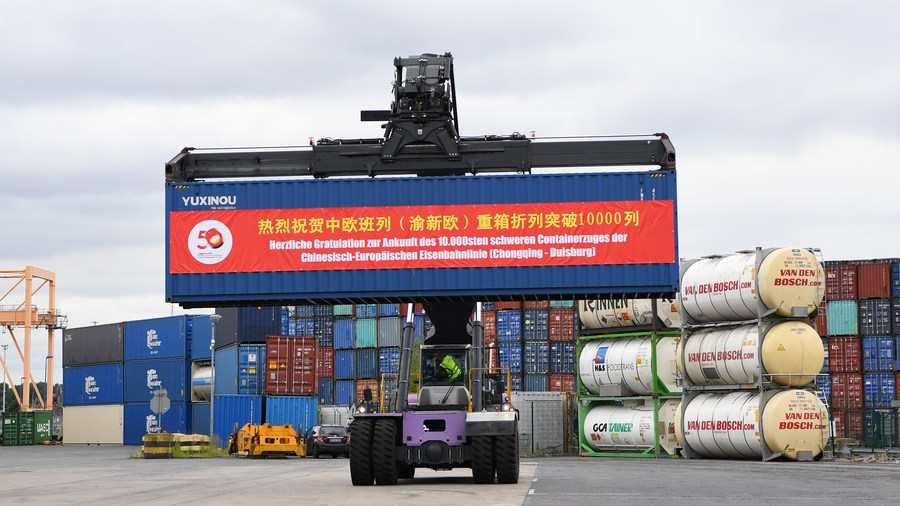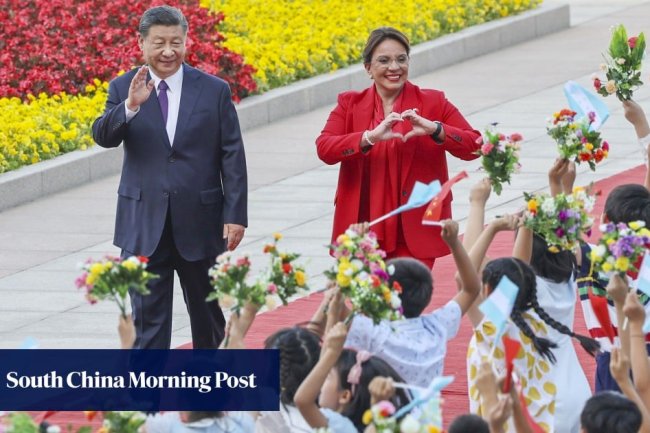Italy's geopolitical balancing act between the U.S. and China
Italy's Prime Minister Giorgia Meloni (C) speaks in her first address to parliament in Rome, Italy, October 25, 2022. /CFP Italy's Prime Minister Giorgia Meloni (C) speaks in her first address to parliament in Rome, Italy, October 25, 2022. /CFP Editor's note: Fabio Massimo Parenti is an associate professor of International Studies at China Foreign Affairs University, Beijing, and a member of various think tanks. The article reflects the author's opinions and not necessarily those of CGTN.The Italian Prime Minister Giorgia Meloni has recently flown to the U.S. to meet President Joe Biden at the White House and discuss several dossiers beyond the bilateral ties: Ukraine, Africa, and China. Before her departure, some Italian media have provided information about Washington's strong pressure on Rome to walk away from the Memorandum of Understanding on the Belt and Road Initiative (BRI) the Italian gove


Italy's Prime Minister Giorgia Meloni (C) speaks in her first address to parliament in Rome, Italy, October 25, 2022. /CFP
Editor's note: Fabio Massimo Parenti is an associate professor of International Studies at China Foreign Affairs University, Beijing, and a member of various think tanks. The article reflects the author's opinions and not necessarily those of CGTN.
The Italian Prime Minister Giorgia Meloni has recently flown to the U.S. to meet President Joe Biden at the White House and discuss several dossiers beyond the bilateral ties: Ukraine, Africa, and China. Before her departure, some Italian media have provided information about Washington's strong pressure on Rome to walk away from the Memorandum of Understanding on the Belt and Road Initiative (BRI) the Italian government signed in March 2019. However, both Italian and some influential foreign media have just speculated on this topic for months, without providing concrete evidence in support.
Having lost World War II alongside Germany and Japan, Italy is still heavily subject to U.S. foreign policy, even outside the framework of the Atlantic Alliance (NATO). Although the Italian rightist coalition is not well seen by the U.S. Democrats on different topics, such as LGBTQI+ or environmental issues, thus geopolitical restraints and tasks remain the same.
Meloni was perfectly aware of it, so she started to hold an unswerving pro-Ukraine and pro-NATO stance already when her party, Brothers of Italy, was in opposition to the former Italian Prime Minister Mario Draghi's Government. In this way, Meloni reversed her previously critical positions on NATO and the EU. About China, we should also remind that several ministries of the current Executive, such as Guido Crosetto (Defence) and Adolfo Urso (Business and Made in Italy), show little interest in cooperation with China in several fields such as geopolitics, IT, and cyber-security, critical raw materials, renewable energies, and investments.
According to Meloni's words during the joint press conference with President Biden, the White House has never put pressure on her government to impose what Italy has to do or not do. Nevertheless, the simple fact that the relationship with China finds room within the U.S.-Italy bilateral agenda is already a form of interference. So said, nothing is settled yet, but Rome will have to decide whether to renew or leave the BRI deal within December.
Before that date, Giorgia Meloni will fly to Beijing, as she has announced, confirming the acceptance of Chinese President Xi Jinping's invitation in November 2022. This means that both Meloni and Biden perfectly know that China is still an essential partner for the West and the so-called de-risking strategies aimed to decouple the two sides would rapidly lead to the collapse of the remaining industrial system in the EU and the U.S. This is why they have both defined China as "a challenge and an opportunity," remarking the now classic description Western governments are used to employ for outlining their relationship with Beijing.

A scene from the welcome ceremony for the 10,000th trip made by China-Europe freight trains operated by the China-Europe Railway Express (Chongqing) in Duisburg, Germany, July 11, 2022. /Xinhua
Italy's geographical position, in the heart of the Mediterranean Sea, gets the country very close to the Near East and Middle East. Since ancient times this particular feature has projected Italy's (including pre-unitary Italian states) foreign policy vectors to Northern Africa, Anatolian Peninsula, Persia, and by extension Central Asia, India, and China. It is not a case that many famous Italian explorers set off for Asia such as Marco Polo, Matteo Ricci, Giovanni da Pian del Carpine, Odorico da Pordenone, Niccolò de' Conti, and Ludovico di Varthema.
However, the 20th century changed many things. The Kingdom of Italy waged war on Ottoman Turkey to conquer Libya in 1911 and lately, the Fascist regime attacked the Soviet Union, Greece, Yugoslavia, and a relevant portion of Eastern Africa. After the loss in World War II, Italy was rapidly included in the U.S.-British camp and became an important NATO military hub in the Mediterranean. This subordinated position in the international hierarchy is still a huge problem for Italian people and their interests because it still maintains a sort of "Cold War" inertia in a completely transformed world, where Asia is driving global growth in many respects.
Let's see some examples. When the European Commission decided to reduce heavily its natural gas import from Russia last year, Italy was one of the most exposed countries to the consequent energy crisis and Italian manufacturers and consumers are still hurting because of the high inflation rate. Any other tension with an economic giant like China could be lethal for the Italian economy.
Beijing would like that Italy played an important role in making the EU-China relationship better, without U.S. interference. Meloni is trying to increase further Italian export all over the world as part of a strategic trade diplomacy based on the re-launch of the "Made in Italy." In the first five months of this year, indeed the Italian export to China increased by 58 percent. However, China is not only one of the largest destination markets for Italian goods and services, but also an increasingly attractive hub for investment in several industries in light of the new Foreign Investment Law, which entered into force in 2020, and the development of the new pilot free trade zones and ports.
(If you want to contribute and have specific expertise, please contact us at [email protected]. Follow @thouse_opinions on Twitter to discover the latest commentaries in the CGTN Opinion Section.)
What's Your Reaction?






















